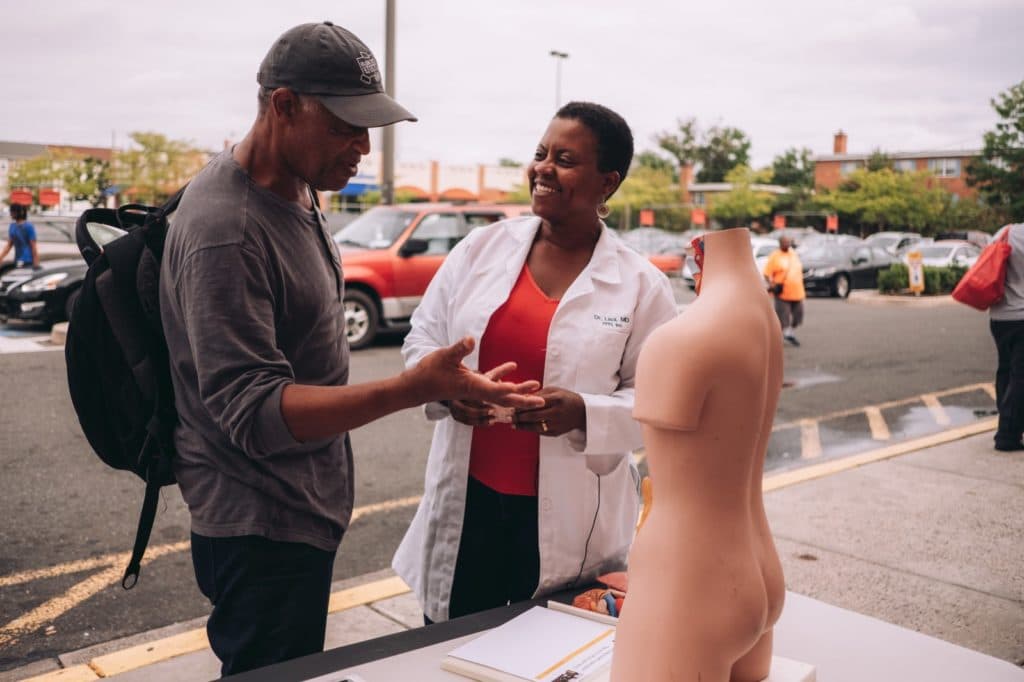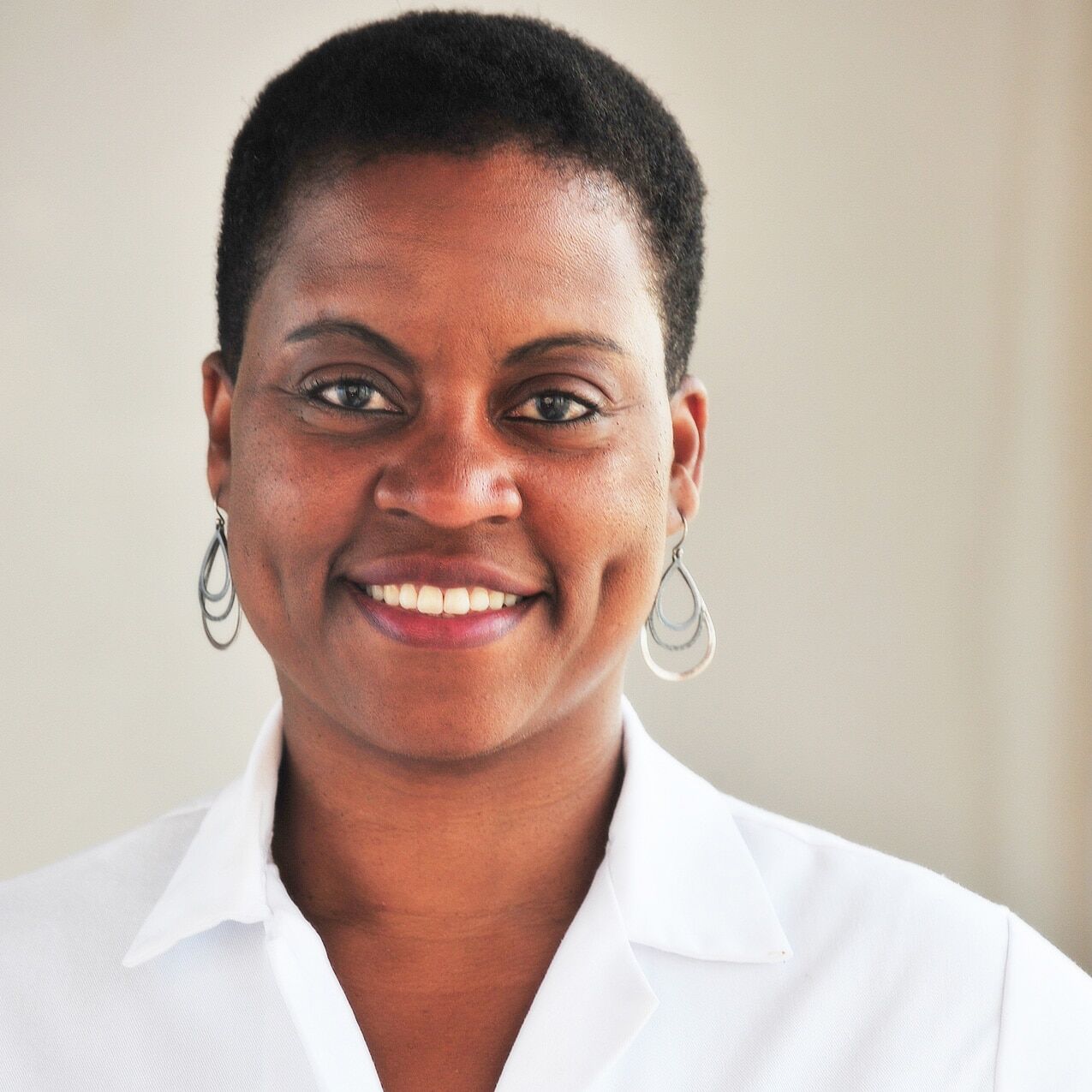| Problem Addressed | Misinformation and Access to Healthcare |
| Solution | Founded Grapevine Health to improve health literacy and health outcomes in low income communities |
| Location | Washington, DC |
| Impact | Local |
What she did
Lisa Fitzpatrick, M.D., started Grapevine Health, a health information company that uses storytelling, videos, social media and person-to-person conversations to increase health literacy in low income communities and improve health outcomes.
Her story
Pre-COVID-19, Lisa Fitzpatrick, M.D. could be found setting up a table outside a local grocery store, donning a white lab coat, and setting a skeleton out on the table to attract attention. “How odd is it to see someone on the street with a white coat standing with a skeleton?” Fitzpatrick laughs. “That’s how we get people to come up: they’ve never seen doctors standing out on the street.”
It is an excuse to start a conversation. The on-the-street health consultations that Dr. Fitzpatrick and her outreach practice, Grapevine Health, provide are intended to answer the public’s questions about both acute problems like a rash and chronic health problems like diabetes, heart disease, or cancer. The company does not provide diagnostic services but instead seeks to clarify information and correct misinformation that community members have received from a range of sources. More importantly, Grapevine’s consultations are intended to build trust between the medical establishment and a community that has had a limited and impersonal relationship with it.

In the Washington, DC community that Fitzpatrick serves, chronic conditions like diabetes and heart disease impact residents at greater-than-average rates. Grapevine helps residents navigate unfamiliar medical terminology and what can seem to be a confusing patchwork of options about their care, what advice to follow, and where they can find reliable information. While Fitzpatrick introduces herself on the street, it’s the digital platforms of YouTube and text messaging where she wants to continue the conversation with the community. Through these channels, she delivers vital information that can help increase their understanding of their medical conditions and what their doctor has prescribed. In particular, improving health literacy is known to be a first step toward increasing patients’ compliance with treatment plans and producing better health outcomes.
Grapevine Health is the culmination of a ten-year journey in which Fitzpatrick sought to increase health literacy in low income populations. Her company’s mission: “to improve health literacy and patient engagement by incorporating the voice of the community in the interventions.”
Fitzpatrick started out as an infectious diseases physician at the CDC, where her work focused on outbreak investigation, prevention, and health literacy issues. In 2008, she took an academic position in Washington, DC’s Howard University Hospital, where she also ran some of their clinical programs because she “wanted to be closer to the ground.” It was her contact with patients served by these programs that ignited her interest in improving health literacy in low income communities and started her on the path to founding Grapevine Health.
Fitzpatrick recognized that this community’s residents had little or no personal familiarity with healthcare providers or medical researchers, and she saw how deeply that impacted their ability to trust the healthcare system. She says, “I just became humbled by how little people understood about what we were saying as providers and researchers…. I think distrust is driving a lot of the health outcomes we’re seeing in black and brown communities.”
That realization led Fitzpatrick to make two important decisions. In 2012, she created Promoting Practical Health, a nonprofit committed to improving health literacy. When she found that raising funds as a new nonprofit was a very slow grind, she decided she needed to go in another direction. In 2014, Fitzpatrick took a sabbatical to study entrepreneurship and social innovation at the Harvard Kennedy School. Following her studies, Fitzpatrick committed to starting a for-profit business and began talking to people who worked with Medicaid in the nation’s capital, thinking they might fund her new venture. Instead, they offered her – and she accepted – the job of Chief Medical Officer. She continued, however, to explore the market and develop her vision.
In a 2016 TEDxMidAtlantic talk, Fitzpatrick claimed that low health literacy costs the U.S. anywhere from $106 billion to $238 billion annually. The higher cost of care stems from the fact that people with low health literacy are more likely to enter the health care system sicker than other patients, in part because they often don’t have consults with a personal physician and don’t readily follow prescriptions for treatments or preventive measures.
In 2018, with funding from the Commonwealth Fund, Fitzpatrick conducted a survey in which more than 50% of her respondents reported that they get trusted health information from people they know, like friends and family, rather than from medical professionals. In other words, from the grapevine. Fitzpatrick not only had an important piece of research that supported the solution she was developing, she also had a name for her new business. She incorporated Grapevine Health as a commercial business early in 2019.
Grapevine’s business model depends on establishing contracts with insurance companies that would pay Grapevine Health to produce videos for the Medicaid population. Grapevine’s Commonwealth Fund research had also revealed that digital health strategies were vital to addressing low health literacy and health misinformation. Understanding the imperative to improve health outcomes in the Medicaid community, Fitzpatrick approached health literacy both on the ground and online, building a team that includes a researcher/public health strategist, a videographer/storyteller, and outreach specialists.
To make sure their online messages have an audience, Grapevine doctors, including Fitzpatrick and her co-founder, Neal Sikka, M.D. – an associate professor at George Washington University and practicing emergency physician – spend time on the ground building up trusted relationships in the community. To help further build that trust, Fitzpatrick moved into the neighborhood she now serves. In her view, it’s all about building credibility and recognition with local residents—providing them with familiar faces and regular interactions.
Spreading good “viral” information online has been especially important during the COVID-19 pandemic. With social distancing and stay-at-home orders in place, Grapevine is using social media to engage members of the community and dispel myths around the virus. Fitzpatrick holds regular Facebook and Instagram live sessions, and has an active presence on YouTube, where she holds forth in her “Ask Dr. Lisa” and @drlisaonthestreet talks. These posts have included content that ranges from discussions about handwashing, to resident Q&As, to talking to a local city council member from D.C.’s Ward 8 about ways to help the community adopt social distancing practices.
In one “Ask Dr. Lisa on the Street” YouTube video, “Let’s Dance” (produced before social distancing orders were in place), Fitzpatrick took on the need for exercise by sharing alternatives to gyms and other recreation facilities that are costly and, during the pandemic, are closed. She set out a sign and a speaker on the street corner, and invited people to dance along with her “because dancing is a form of exercise – and it’s free.” Many joined in, and one driver even began dancing along in his car while stopped at a traffic light.
With social distancing orders in place, and few opportunities for such personal interactions as “Dr. Lisa on the Street”, Fitzpatrick is scaling up her organization to increase the level and consistency of online engagement. She has brought on three college students over the summer to help with logistics and video production. And with insurance companies’ decisions on funding put on hold because of COVID-19 and the economic crisis, she is using her own funds to sustain the organization.
As Grapevine continues its mission to arm this community with verifiable and evidence-based health information, Fitzpatrick demonstrates that one way to overcome health misinformation among disengaged communities is to have a visible presence and use simple and entertaining communication to help the people in those communities make better health decisions.
Update: Business Insider reported in mid-August that Dr. Fitzpatrick “is helping to craft healthcare policy for Joe Biden, the Democratic nominee for president.”
Update 2: To demonstrate that a coronavirus vaccine can be trusted, Dr. Lisa volunteered for the Phase 3 Moderna mRNA-1273 vaccine trial. (Business Insider)
Written by George Linzer and Robin Stevens Payes
Published on June 25, 2020
Updates posted September 2 and October 21, 2020
Sources
Lisa Fitzpatrick, phone interview with Robin Stevens Payes, Mar 28, 2020 and Facetime follow up interview with George Linzer, Jun 8, 2020
TEDxMidatlantic, “Are you confused about health information? You’re not alone | Lisa Fitzpatrick”, Jun 29, 2016, https://www.youtube.com/watch?v=-x6DLqtaK2g, accessed May 25, 2020
Commonwealth Fund, “Commonwealth Fund awards Promoting Practical Health, Inc., a grant to study health literacy and patient engagement with digital technology”, Press release, Sep 6, 2018,“https://www.linkedin.com/pulse/commonwealth-fund-awards-promoting-practical-health-inc-md-mph-mpa/, accessed May 25, 2020
Lisa Fitzpatrick, M.D., “The Time Is Now, The Case for Digital Health Innovation for the Poor and Underserved”, Commonwealth Fund, Dec 18, 2018, https://www.commonwealthfund.org/blog/2018/time-now-case-digital-health-innovation-poor-and-underserved, accessed May 25, 2020
Lisa Fitzpatrick, M.D., “Skyping in the Hood”, Huffington Post, Apr 17, 2017, https://www.huffpost.com/entry/skyping-in-the-hood-misperceptions-about-health-it, accessed May 25, 2020
Laurie Zephyrin, M.D., et al., Commonwealth Fund, “COVID-19 More Prevalent, Deadlier, in U.S. Counties with Higher Black Populations”, Apr 23, 2020, https://www.commonwealthfund.org/blog/2020/covid-19-more-prevalent-deadlier-us-counties-higher-black-populations, accessed May 25, 2020
Jolie N. Haun, et al., “Association between health literacy and medical care costs in an integrated healthcare system: a regional population based study”, NCBI, National Library of Medicine, Jun 27, 2015, https://www.ncbi.nlm.nih.gov/pmc/articles/PMC4482196/, accessed May 25, 2020
Have a Suggestion?
Know a leader? Progress story? Cool tool? Want us to cover a new problem?


